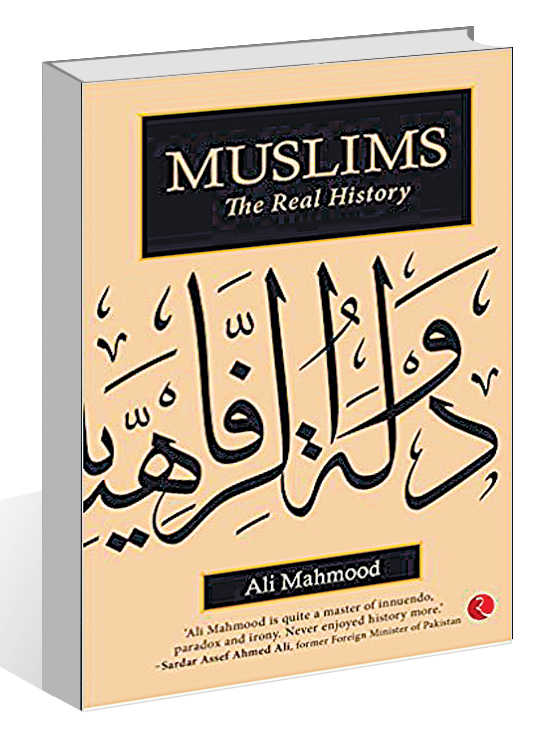
Muslims: The Real History by Ali Mahmood. Rupa. Pages 460. Rs 795
Parbina Rashid
Here is a confession — I am not a religious person, but, of late, I have found myself picking up books based only on religion. Last week, it was Nazia Erum’s Mothering a Muslim, and now Muslims: The Real History. Probably, that’s what a religiously charged socio-political atmosphere does to you — makes you look inward.
Ali Mahmood’s book is the perfect guide for anyone trying to understand the Islamic civilisation and the desert politics, which has been influencing world politics ever since the birth of Prophet Muhammad.
Mahmood, with degrees in politics, economics and law from Pakistan and the UK, and a wide range of business interests in Pakistan, Dubai, Kuwait, Abu Dhabi and Kazakhstan, glides smoothly into the realm of history, highlighting the period between the seventh century and the early 17th century, what has been termed as the Golden Age of Islamic civilisation when the Ummayyads, Abbasids, Fatimids, Timurids, Ottomans, Safavids and Moguls ruled to gift the world a sound knowledge of science, education and civilisation.
Successive wars, rise and fall of different dynasties, the life of great men and their achievement spread over almost 14 centuries (the book covers events till date) would have been quite a lot to take in at one go, had it not been the author’s relatable expressions without dwelling much into dates and chronology of events as most history books tend to do. The past re-appears here with an easy-breezy feel.
Here is a sample. Stating how the reign of Harun Al Rashid and his son Mamun had established the dominance of the Muslims in knowledge, science, education and civilisation, the author explains, “While Mamun collected the greatest minds of his time in his Bayt al Hikma — university, library and centre of mathematics, algebra, physics, astronomy, medicine, architecture and translation — in Europe, the great emperor, Charlemagne, was merely learning how to write his name.”
Sarcasm aside, tough questions are being put up and equally tough answers are being offered. The author is unsparing when he explains what gave the Muslim conquerors an edge over the local inhabitants of India, which was a vast Hindu majority. “Islam promoted the key values of merit, equality and knowledge and a conviction of a better world after death, created courageous warriors who feared nothing. But it was also the attitude of the Indian themselves, who were so divided internally that they saw the invaders as merely another group, no more alien than the numerous and diverse groups that already peopled India.”
Mahmood beautifully balances the seriousness of his subject with innuendos, paradoxes and irony. Here is one of my favourites — “The Muslims invented the first steam engine, but the only use they could put it to, was in turning a sheep over the fire to get an evenly cooked roast. In the practical hands of the West, the steam engine fired the Industrial Revolution.” His classic analysis of how Europe eclipsed the Muslim empire!
Even figures, dreaded and distanced in history books, come alive in his hand. Babur, a deliberate drunkard, at the age of 44, gave up alcohol, on February 25, 1527, just before the decisive battle with Rana Sanga, by dramatically smashing his cups and reciting a couplet, “While others repent and make vows to abstain; I have vowed to abstain and repentant I am.”
Mahmood’s assessment of the present is insightful and engrossing, making his book an important link between the world of Muslims during their golden years and the Muslims of today, who are divided into two distinct categories — the majority who believe that Islam is a religion of peace and the radical minority who equate Islam with jihad.



























